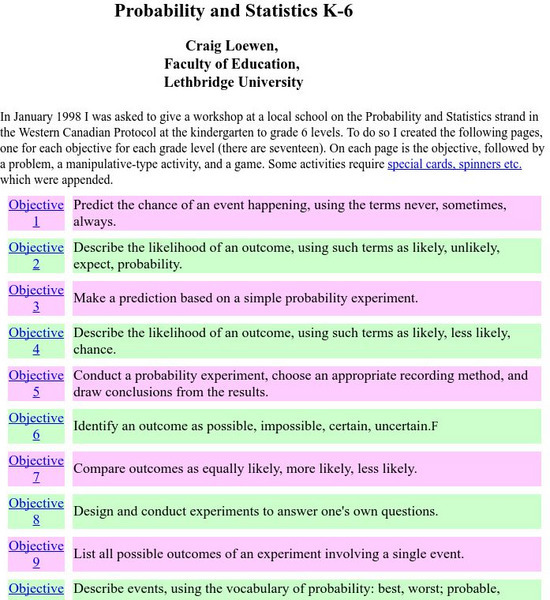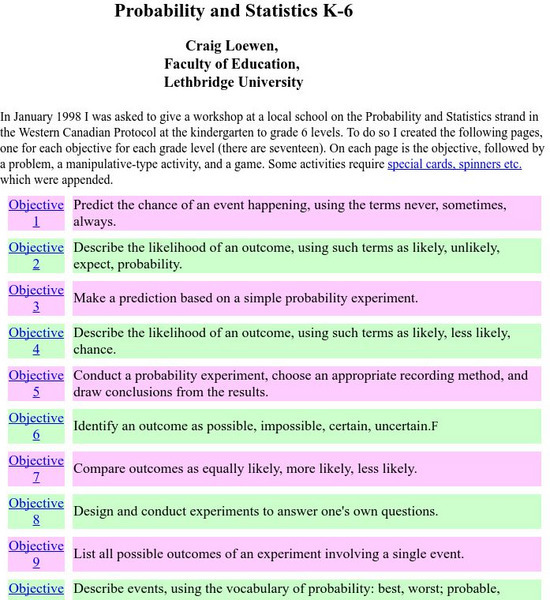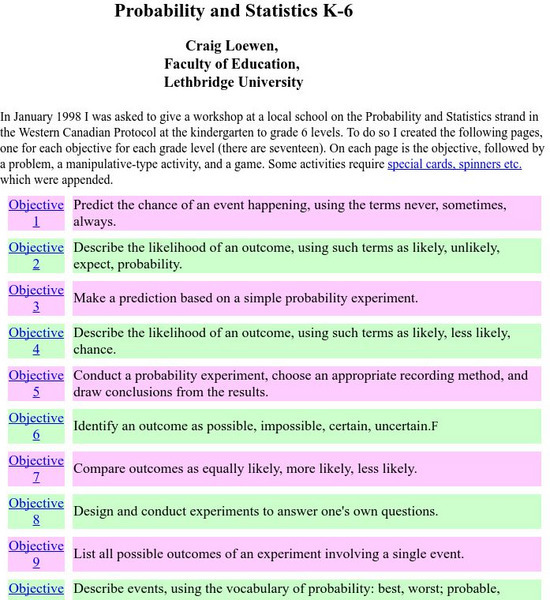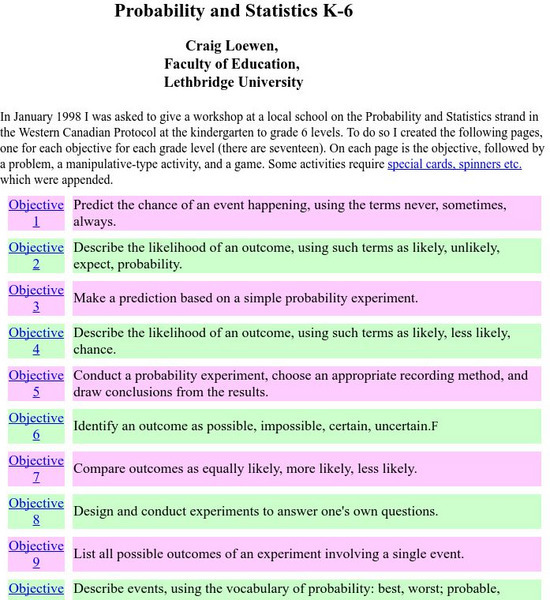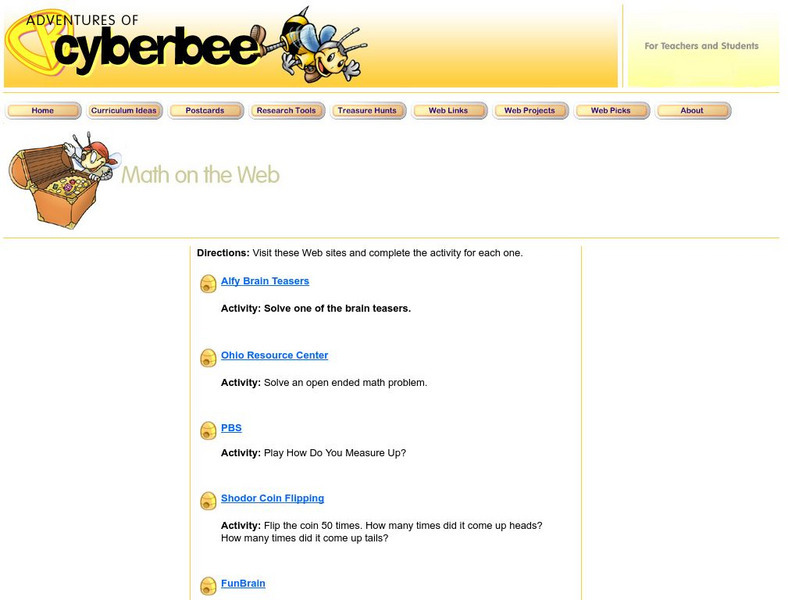Hi, what do you want to do?
Curated OER
Dice Games
Games and activities are wonderful for igniting interest in nearly any topic. With a pair of dice, your class will practice their basic math and social skills at the same time. Learners battle it out to see who can roll only odds or only...
Google
Probability Project: Design Your Own Game
Designing a game is the focus of this probability lesson. Groups develop and build a unique game, including directions for how to play, a calculation of the expected value of winning, and a personal reflection. The plan provides a...
Curated OER
Math Games for Skills and Concepts
A 27-page packet full of math games and activities builds on algebra, measurement, geometry, fractional, and graphing skills. Young mathematicians participate in math games collaboratively, promoting teamwork and skills practice.
Curated OER
Pi Day: The Other Math Holiday!
Happy Pi Day! This collection of games, experiments, and activities leads participants through an exploration of the many aspects and attributes of that mysterious quantity, pi. Activities range from using statistical...
Illustrative Mathematics
Return to Fred's Fun Factory (with 50 Cents)
The penny arcade gets the statistics treatment in this fun probability investigation. A non-standard game of chance is described and then the class is set loose to find missing probabilities, determine common outcomes, and evaluate...
Curated OER
Mathematics Activities from Diverse Cultures
Connect probability and odds with different games from around the world. Pick from games like Dreidel, Mancala, and a Navajo stick game called Ashbil. All 12 games include probability questions to encourage a discussion before or after...
Curated OER
Rating Systems
Your favorite sports team is ranked #1. How do the powers that be determine this rating? Learn how ratings are mathematically computed using probability concepts, from the Elo Rating System for chess to the Rating Percentage Index for...
Curated OER
Alex, Mel, and Chelsea Play a Game
This short probability question may look simple at first, but it is actually quite complex! Learners must understand independent events in context and must take into account several different scenarios. Use as an individual assignment...
Curated OER
M&M Science and Math
A series of math and science activities feature M&M's® as manipulatives to help kids work through equations. The resource includes exercises on finding averages, percent of compositions, moles in chemical reactions, genotypes and...
Curated OER
Tetrahedral Dice
Put those thinking hats on and look at all the possible outcomes from rolling two different four-sided dice. The challenge in this problem is finding all the combinations when adding and subtracting the numbers from each die and creating...
Curated OER
Flipping for a Grade
What happens when your teachers get tired of grading tests and want to use games of chance to determine your grade? How would you decide which game they should play? Learn how to use expected value and standard notation to compare two...
Computer Science Unplugged
Twenty Guesses—Information Theory
How do we determine how much information to include and what can be left out? By playing a game of 20 questions, the class generates the best strategies for finding a number. They then move on to guessing the next letter in a short...
Wake Forest University
Authentic Activities for Connecting Mathematics to the Real World
Check out the handout from a presentation that contains a collection of high school algebra projects connecting a variety of mathematics to the real world. Activities range from simple probabilities to calculus. The activities...
Curated OER
Fred's Fun Factory
Round and round and round she goes. Where she stops, nobody knows. This activity uses a common arcade game of chance, the spinning wheel, as a platform for computing expected values, interpreting results, and applying this knowledge to...
National Council of Teachers of Mathematics
Is It Fair?
In this probability instructional activity, learners answer nine questions about the fairness of games. High schoolers determine if a game is fair or not. They list outcomes and find ones' chances of winning.
Curated OER
Sounds Really Good! (sort of...)
Your friend Phil wants to know if he should play the lottery. Have your class use the given data to compute the expected value and explain to Phil what he should do and why. This handout is ideal for a quick assessment of skill and...
University of Cambridge
University of Cambridge: Maths and Sports: What's the Point of Squash?
Squash isn't an Olympic sport (yet!) but it has an interesting scoring system. If you reach 8-all in a game of squash, when should you decide to play to 9 points rather than 10? This activity is a starting point for mathematical...
University of Regina (Canada)
University of Regina: Math Central: Probability and Statistics K 6
A compilation of resources devoted to teaching probability and statistics. The resources are broken into seventeen different objectives that have a problem, activity, and a game.
National Council of Teachers of Mathematics
Nctm: Figure This: Wheel of Fortune's Frequent Letters
Did you know that letter guessing on Wheel of Fortune is based on probability? In this challenge taken from one of TV's most popular game shows, discover what consonant or vowel should be guessed next based on letters already given. A...
University of Regina (Canada)
University of Regina: Math Central: Probability and Statistics K 6
A compilation of resources devoted to teaching probability and statistics. The resources are broken into seventeen different objectives that have a problem, activity, and a game.
University of Regina (Canada)
University of Regina: Math Central: Probability and Statistics K 6
A compilation of resources devoted to teaching probability and statistics. The resources are broken into seventeen different objectives that have a problem, activity, and a game.
University of Regina (Canada)
University of Regina: Math Central: Probability and Statistics K 6
A compilation of resources devoted to teaching probability and statistics. The resources are broken into seventeen different objectives that have a problem, activity, and a game.
National Council of Teachers of Mathematics
Nctm: Figure This: Who Wins the Game?
A math challenge for the basketball enthusiast. This NCTM Math Challenges for Families activity focuses on the concept of probability. Test your problem solving aptitude as you try to figure out who will probably win the game.
Cyberbee
Adventures of Cyberbee: Math on the Web (Web Quest)
Site from Adventures of Cyberbee offers math related web quests. These web quests contain many challenging activities.






















